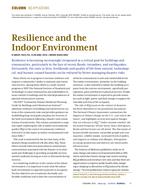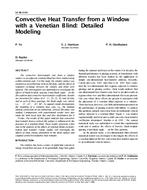Track: Standards, Guidelines and Codes
Sponsor: 2.7 Seismic and Wind Resistant Design
Chair: Harold Dubensky, Member, Johnson Controls, Inc., York, PA
The presentations cover the latest building codes with regards to protecting HVAC components from seismic and wind events, as well as the International Building Code requirements and specific rules addressed by ASCE 7. Seismic and wind loading on HVAC components is reviewed and restraints that keep the components in place after these events. The presentations also include an overview of the best practices, industry recommendations, and clarification of ASCE 7 updates. Finally, research that is on the forefront of the HVAC&R industry is introduced.
1. Overview (FEMA) of Best Practices and Industry Recommendations
Scott Campbell, Ph.D., Member, Structural Analysis Consulting Group, Milwaukee, WI
Current practice in wind and seismic restraint of HVACR equipment goes beyond formal codes and standards to include guidelines and rules of thumb. In addition, some of the requirements are not easy to find and often overlooked. This seminar discusses those items affecting HVAC restraint design that are outside of ASCE 7, and also includes information on upcoming changes in those documents.
2. Updates of Seismic Load Design Requirements for HVACR Components
Karl Peterman, Member, Vibro-Acoustics, Markham, ON, Canada
Standard ASCE/SEI 7, Minimum Design Loads for Buildings and Other Structures, is the basis for the structural load design requirements in most national, state, and local building codes. The previous version, ASCE/SEI 7-10, is adopted by reference in the 2012 and 2015 IBC’s. The newest edition of the standard, which was published last year, will be the basis of the 2018 IBC. ASCE/SEI 7-16 includes changes to the seismic load provisions that will affect the design and selection of various HVACR components and restraints. This presentation highlights the significant changes that will have an impact on the HVACR industry.
3. Significant Changes to the Wind Load Design Requirements for HVACR Components
Panos Papavizas, Member, Baltimore Aircoil Company, Jessup, MD
Standard ASCE/SEI 7, Minimum Design Loads for Buildings and Other Structures, is the basis for the structural load design requirements in model and most national, state, and local building codes. The 2010 edition, ASCE/SEI 7-10, is adopted by reference in the 2012 and 2015 IBC’s. The latest edition of the standard, ASCE/SEI 7-16, will be the basis of the 2018 IBC. ASCE/SEI 7-16 includes changes to the wind load provisions that will affect the design and selection of wind-exposed HVACR components and restraints. This presentation highlights the significant changes that will have an impact on the HVACR industry.
Presented: Monday, January 22, 2018, 8:00-9:30 AM
Run Time: 90 min.
This is a zip file that consists of PowerPoint slides synchronized with the audio-recording of the speaker (recorded presentation), PDF files of the slides, and audio only (mp3) for each presentation.
Citation: ASHRAE Seminar Recordings, 2018 Winter Conference, Chicago, IL
Product Details
- Published:
- 2018
- Units of Measure:
- Dual
- File Size:
- 1 file , 150 MB
- Product Code(s):
- D-CH18Sem23


